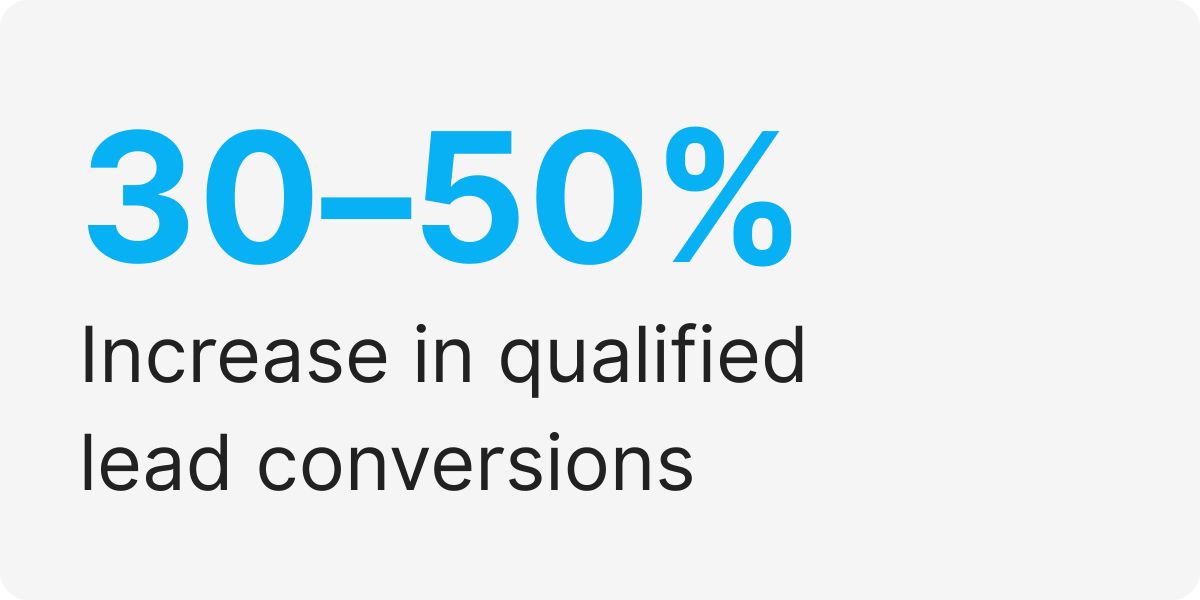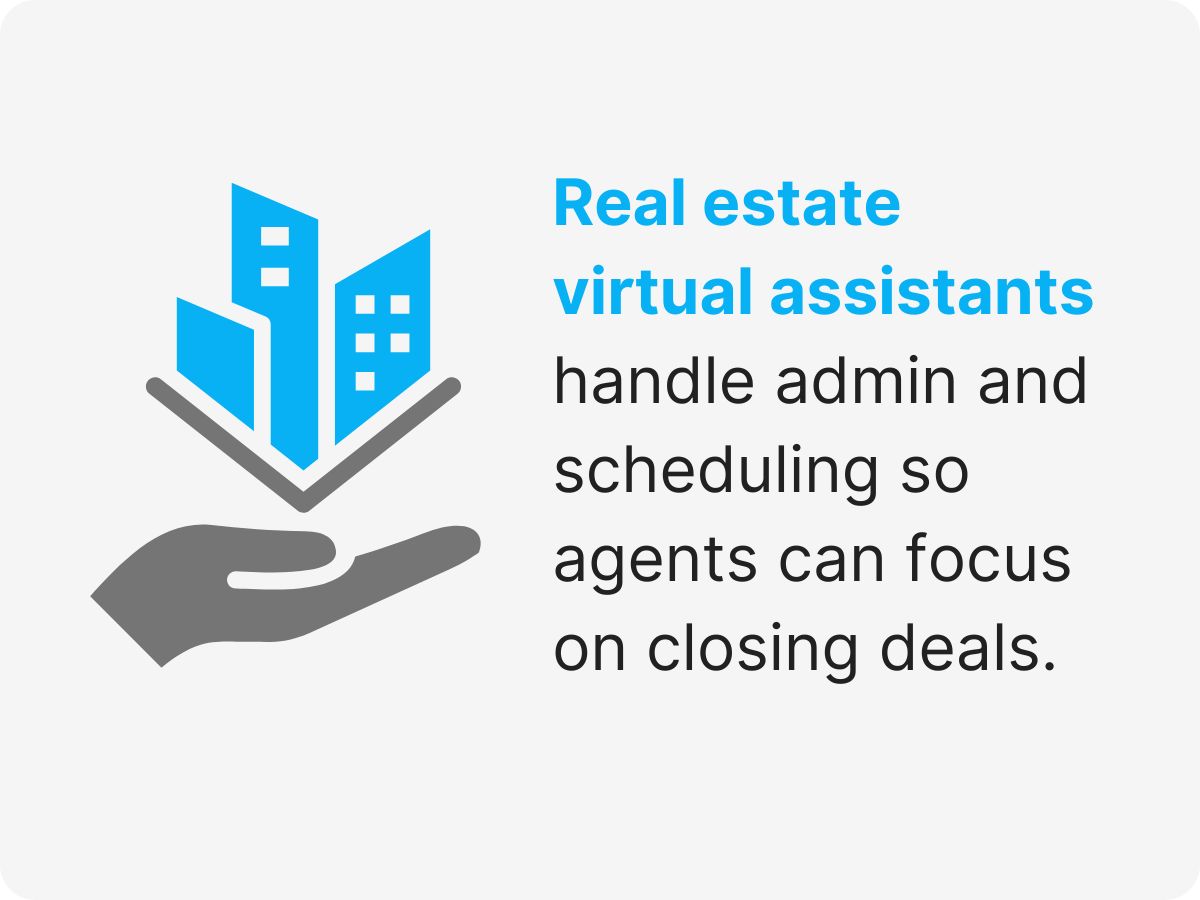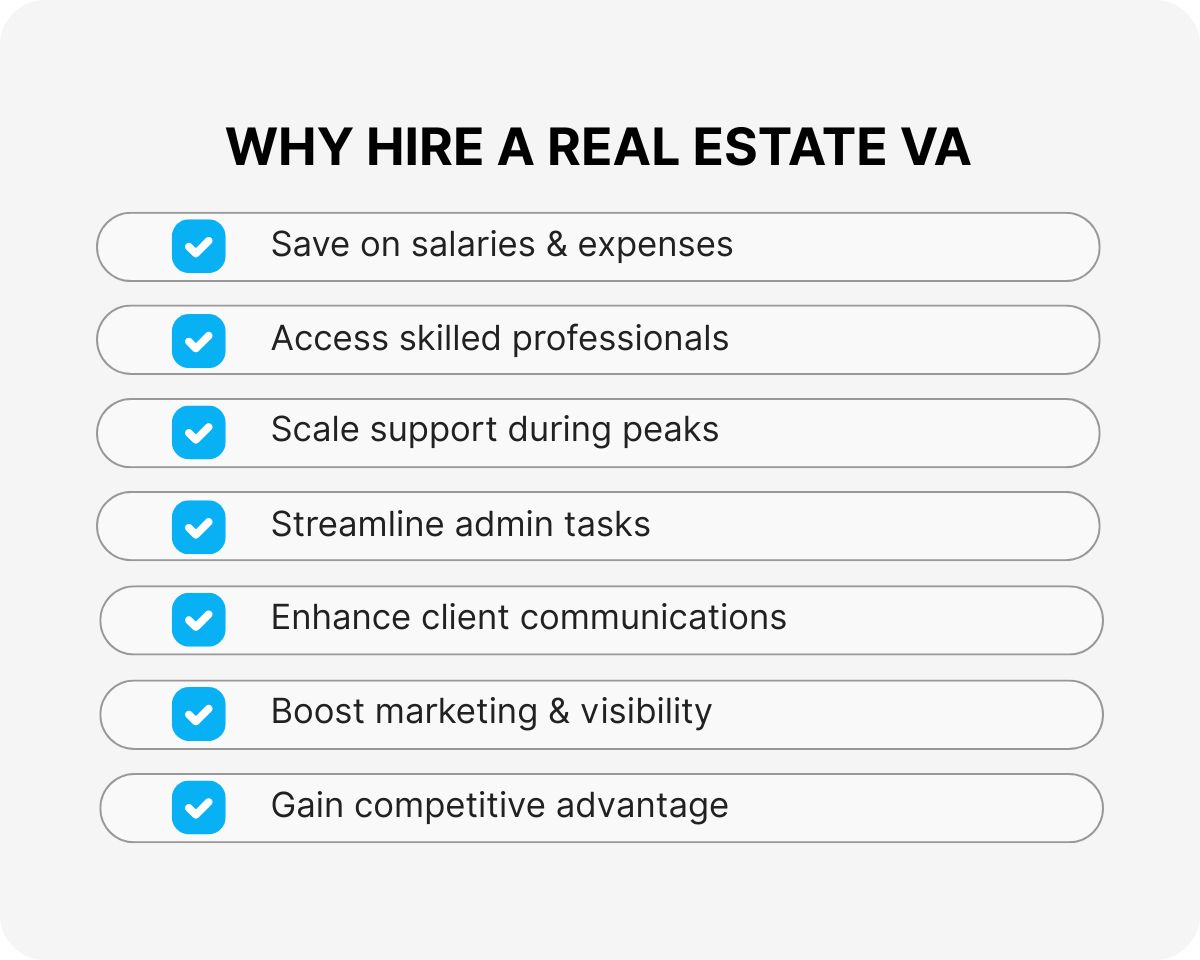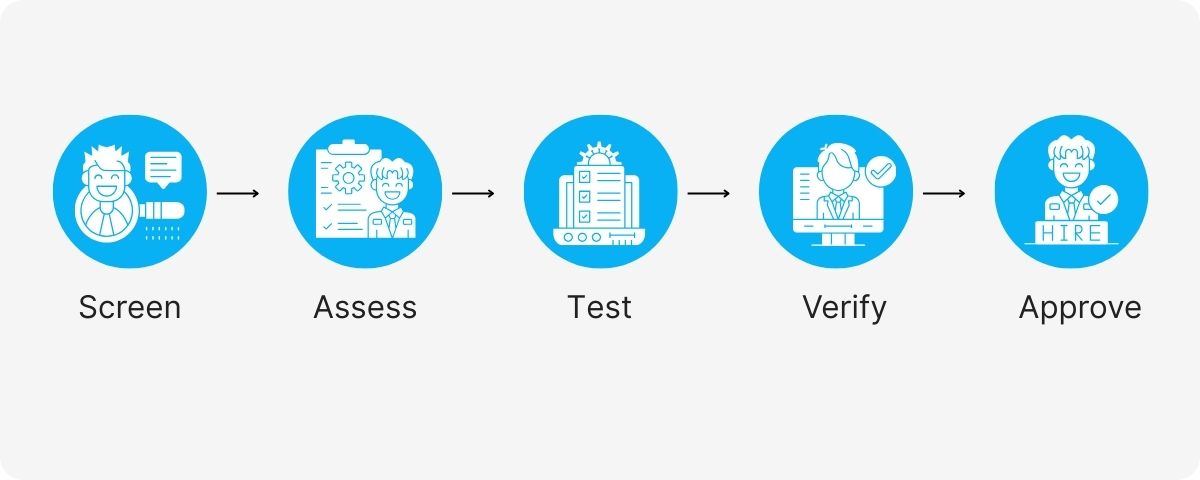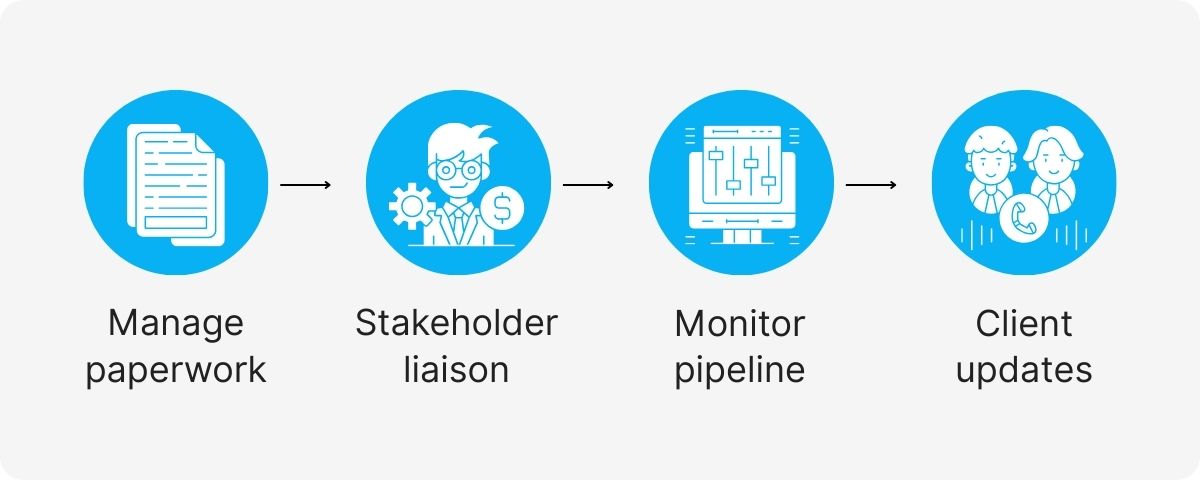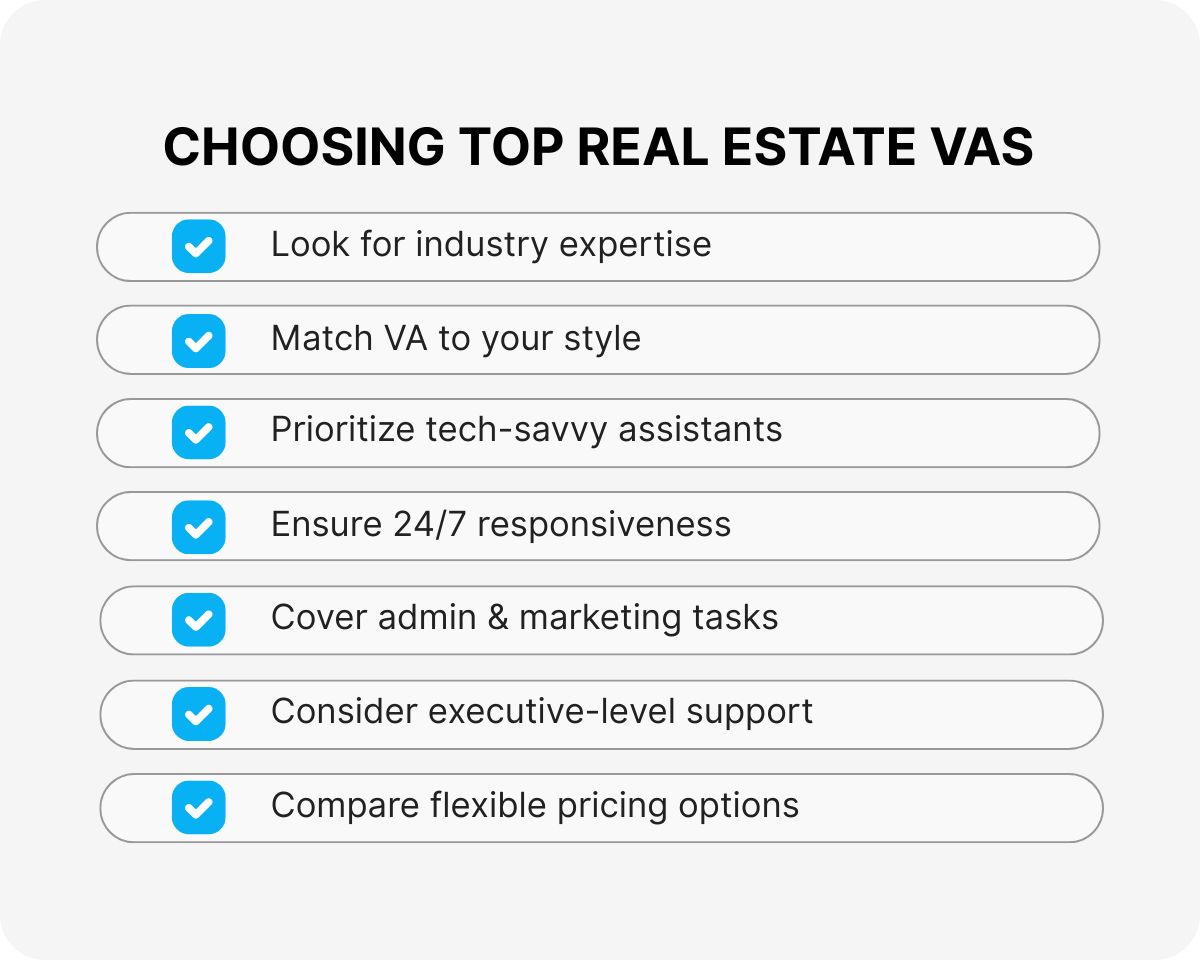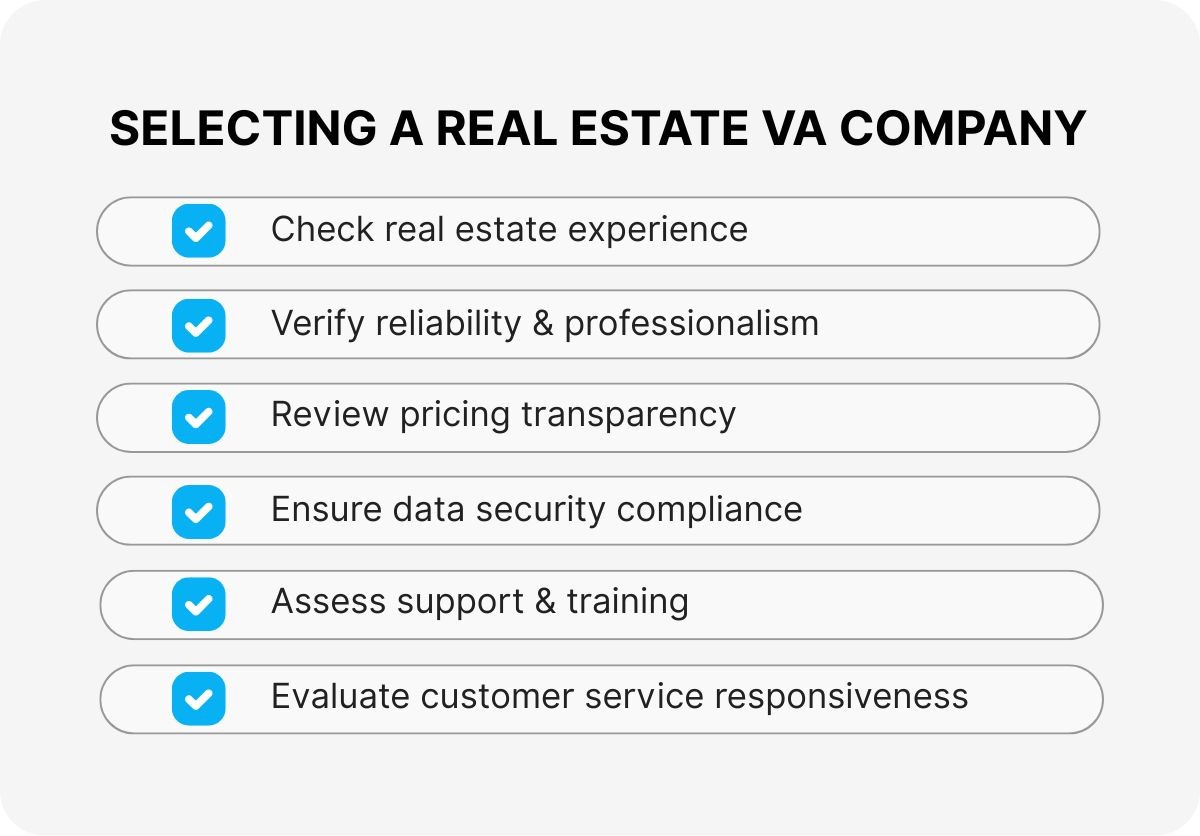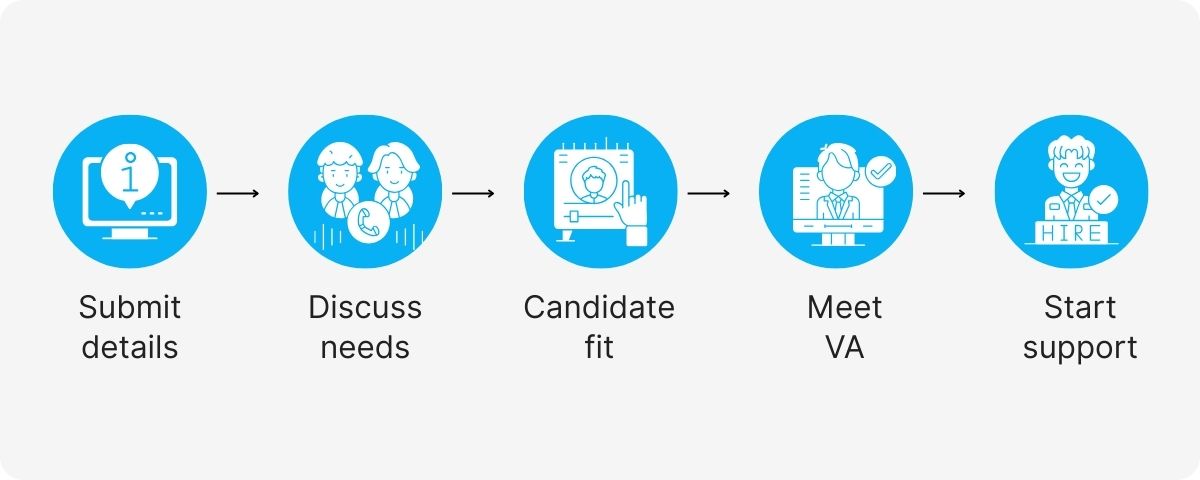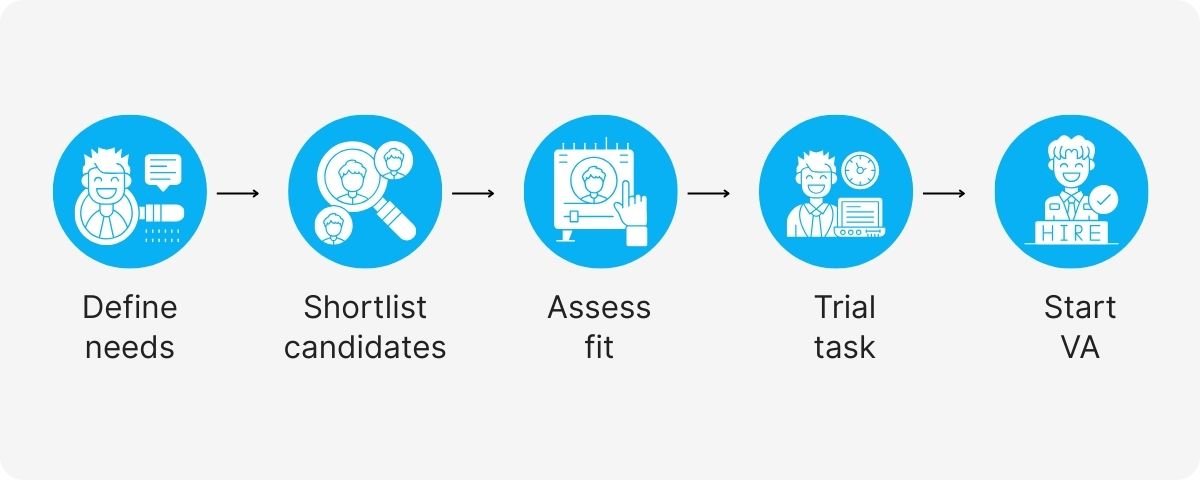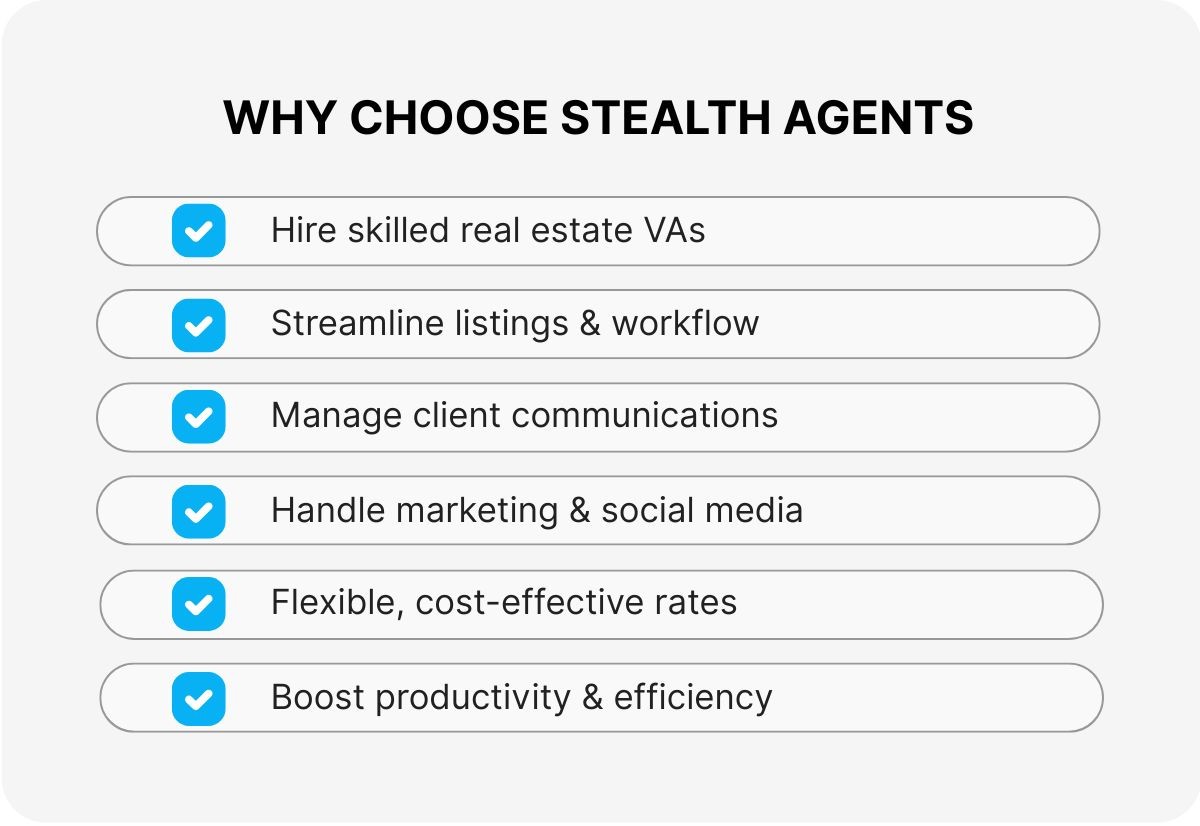Virtual assistants for realtors are the smartest way to delegate time-consuming tasks like lead generation, listing management, and client follow-ups, so you can focus on closing deals.
Stealth Agents provides top 1% vetted real estate virtual assistants to streamline your workflow, save you time, and grow your business faster. Get started now at StealthAgents.com.
Studies show that realtors who respond to new leads within 5 minutes are far more likely to convert than those who wait, sometimes by 400% or more.
Many agents spend up to 60% of their time on administrative tasks paperwork, follow-ups, listing management that don’t directly drive sales.
By delegating these tasks to a Virtual Assistant, realtors can free up hours each week to focus on showings, client relationships, and closing deals.
Tools and assistants that automate lead screening and follow-ups are shown to increase qualified lead conversions by 30-50%, while significantly reducing missed opportunities.
With Stealth Agents, you can access skilled virtual assistants who manage back-end work, help you respond instantly, and keep prospects warm, letting you close more deals with less stress.
Virtual assistants for realtors looking to enhance efficiency and scale their operations.
With the global virtual assistant market expected to grow significantly, it’s no wonder that savvy real estate professionals and assistants are adopting this trend to stay ahead.
Virtual assistants streamline everyday tasks and save real estate businesses up to 78% in operating costs, enabling agents to concentrate on completing sales and building client relationships.
Virtual assistants boost productivity by handling time-consuming administrative tasks, making them an essential asset in a competitive industry.
Stealth Agents offers tailored virtual assistant services for realtors, providing the expertise needed to elevate your business.
Schedule a free consultation today to explore how Stealth Agents can meet your unique preferences and discover their competitive virtual pricing options.
How Outsourced Talent and AI Tools Power Up Real Estate Businesses Combining outsourced talent, like experienced virtual assistants, with cutting-edge AI tools is a game-changer for real estate professionals who want to work smarter, not harder.
This hybrid approach means agents spend less time on repetitive admin, data entry, or screening leads, and more time fostering client relationships and closing deals.
Here’s how this winning combo gives your business an edge:
- Supercharged Efficiency: While virtual assistants tackle time-draining tasks, AI platforms such as Salesforce, HubSpot, or Follow Up Boss help sort, qualify, and nurture leads 24/7. This dual approach drastically reduces turnaround times and lets you respond to clients faster.
- Cost Savings: Pairing human expertise with automated tools streamlines workflows and cuts overhead, letting you scale operations without ballooning expenses.
- Smarter Decision-Making: AI-powered analytics tools extract actionable insights from your data, while your VA keeps information organized and your CRM up to date, all of which help you make informed decisions about where to focus your energy.
- Consistent Client Experiences: Automation sends timely reminders and personalized follow-ups, while your virtual assistant adds a human touch, ensuring clients feel valued at every stage.
What is the Role of a Real Estate Virtual Assistant?
A real estate virtual assistant plays a crucial role in supporting realtors by handling a wide range of administrative, marketing, and client-related tasks remotely.
They manage schedules, appointments, and calendars to ensure realtors stay organized and never miss important meetings or property viewings. These assistants also handle client communication, such as responding to inquiries, following up on leads, and sending reminders, which helps maintain strong relationships with clients.
They assist with marketing efforts by creating and managing social media posts, preparing property listings, and designing promotional materials to attract potential buyers. Real estate virtual assistants also take care of transaction coordination, ensuring all paperwork, deadlines, and communications with lenders or title companies are handled efficiently.
They update and maintain databases or CRM systems, keeping client and property information accurate and accessible. By delegating these time-consuming tasks to a virtual assistant, realtors can focus on high-value activities like closing deals and building client relationships. Ultimately, a real estate virtual assistant helps improve efficiency, save time, and contribute to the overall growth of a realtor’s business.
Why Do Businesses Hire Virtual Assistants for Realtors?
1. Cost Efficiency
Virtual assistants for realtors help businesses reduce costs by eliminating the need for full-time, in-office staff.
This means savings on salaries, benefits, and office-related expenses such as utilities and equipment.
Realtors can redirect their budget toward strategic investment by outsourcing these tasks, directly contributing to their core business activities and growth.
The money saved can be used to fund advertising campaigns, new technology, or professional development programs, further enhancing the business’s competitive stance and market reach.
2. Access to Skilled Professionals
Many virtual assistants for realtors possess specialized skills that are highly beneficial for real estate operations.
These skills, crucial for the best virtual assistants for real estate investors, range from administrative support, such as managing paperwork and contracts, to advanced capabilities, like social media management, graphic design, and digital marketing.
This expertise allows realtors to leverage professional-grade services without extensive training or recruitment.
Virtual assistants for realtors often utilize CRM software, graphic design platforms, and social media scheduling tools, bringing efficiency and professionalism to their tasks and ensuring that realtors benefit from the latest technologies and methodologies.
3. Managing Fluctuating Workloads
The real estate industry is known for its seasonal peaks and troughs. Virtual assistants provide the flexibility to scale support according to business needs, offering additional resources during busy periods without the obligation of long-term employment contracts.
This adaptability ensures that realtors maintain consistent service levels regardless of workload fluctuations.
Scaling Smarter with a Blended Team Approach
When a real estate team is stretched to its limits, growth can quickly hit a wall.
By blending your in-house staff with skilled virtual assistants, you’re able to extend your capabilities without adding to your overhead.
This hybrid team structure means you can ramp up support during high seasons, seamlessly manage off-peak workloads, and avoid the financial commitment of full-time hires.
Moreover, virtual assistants for realtors are adept at quickly pivoting between different tasks, whether handling a surge in client inquiries or assisting with urgent marketing efforts. This ensures that the company is flexible and receptive to ever-changing market demands.
Recognizing the signs that you’re ready for this kind of blended support, such as bottlenecks in client communications, missed opportunities during busy listing months, or administrative tasks overwhelming your team, can help you scale smarter and maintain a high-performing operation year-round.
Moreover, virtual assistants for realtors are adept at quickly pivoting between different tasks, whether handling a surge in client inquiries or assisting with urgent marketing efforts. This ensures that the company is flexible and receptive to ever-changing market demands.
4. Improved Operational Efficiency
This delegation frees up valuable time for realtors to focus on client-facing activities, strategic planning, and deal closure, enhancing overall efficiency and productivity.
For instance, by transferring the responsibility of appointment scheduling to a virtual assistant, realtors can save weekly hours, allowing them to dedicate more time to nurturing client relationships and pursuing high-value business opportunities.
5. Enhanced Client Interactions
Virtual assistants are crucial in managing client communications and ensuring timely and professional interactions.
They can handle inquiries, follow-ups, and updates, which helps maintain strong client relationships.
This level of customer service excellence is essential for fostering loyalty and trust and encouraging repeat business and referrals.
Personalized communication is key, and virtual assistants can tailor responses and engagement strategies based on individual client preferences and histories, creating a more personalized and engaging client experience that fosters long-term commitment.
6. Support for Marketing Efforts
With social media and digital marketing strategies, virtual assistants can help realtors increase their online visibility.
They are competent in social media account management and digital content creation ideas and executing marketing campaigns, allowing realtors to attract more prospective customers and reach a larger audience of clients.
This support is vital for staying competitive in a digital-first marketplace.
Consistent branding across all platforms is crucial, and virtual assistants ensure that all marketing materials align with the company’s brand identity, enhancing brand recognition and building a robust and cohesive market presence.
7. Competitive Edge
Realtors can concentrate on strategic initiatives like business development and market expansion by delegating time-consuming tasks to virtual assistants.
This focus on high-level activities enables them to innovate, explore new markets, and enhance their service offerings, gaining an advantage over industry competitors.
Virtual assistants for realtors empower realtors to experiment with new business models or service enhancements, enabling them to remain at the forefront of the industry and adapt swiftly to emerging trends and opportunities, ensuring sustained growth and market leadership.
Range of Services Offered by Third-Party Real Estate Virtual Assistant Companies
Third-party real estate virtual assistant providers offer a comprehensive array of services tailored to the dynamic needs of realtors and brokerages. These companies source skilled VAs with hands-on experience in the real estate sector, ensuring seamless integration into your daily workflow.
Here’s what you can typically expect:
- Administrative Support: From managing inboxes, phone calls, and documentation to handling data entry, real estate VAs take the repetitive workload off your plate. Firms like REVA Global specialize in VAs trained for transaction coordination, appointment scheduling, and compliance management, keeping operations smooth and organized.
- Client Management: Virtual assistants can handle lead generation, conduct follow-ups, qualify prospects, and manage customer databases. This helps realtors keep their pipelines healthy and their clients engaged without missing important touchpoints.
- Marketing Services: Whether it’s managing social media profiles, creating digital content, or supporting email marketing campaigns, many companies (such as TaskBullet with its flexible “bucket” model) offer marketing-savvy VAs ready to boost your brand visibility. They can also assist with property listings, online advertising, and reputation management.
- Sales Support: Skilled VAs support sales activities by preparing comparative market analyses, managing listings, and keeping transaction documents in order. This lets agents focus on closing deals instead of paperwork.
- Industry-Specific Solutions: Some providers, like VASumo, give access to a global talent pool, tapping into various backgrounds to tailor solutions. You might leverage VAs for property research, market reporting, or specialized software usage.
Vetting Process for Qualified Real Estate Virtual Assistants
A rigorous screening and matching process sets the standard for reputable real estate virtual assistant providers.
Industry leaders like REVA Global, TaskBullet, and VASumo use multi-stage assessments to identify the best candidates.
Here’s how the vetting typically works:
- Initial Screening: Only a small percentage of applicants move forward. Providers often review hundreds of applications, shortlisting candidates based on background, relevant real estate experience, and skill set.
- Background Checks: Comprehensive background checks are a must, ensuring a high degree of trust and security, so you can confidently delegate sensitive tasks.
- Skill and Knowledge Testing: Candidates are put through job-specific exams, covering areas like transaction coordination, CRM management, and real estate marketing. This validates both practical know-how and technical expertise.
- Experience Verification: Providers confirm previous employment and references, making sure your VA is seasoned in real estate settings and meets expected professional standards.
- Culture and Fit Assessment: Top firms evaluate not just hard skills, but also communication abilities and compatibility with your business culture, ensuring a seamless integration into your workflow.
Loan Processing and Transaction Coordination Support
Loan processing can be a tedious and time-consuming element of real estate transactions, but virtual assistants simplify and accelerate every step.
Trained VAs from providers like Virtudesk or Rocket Station specialize in supporting loan officers and realtors by handling a range of administrative tasks that can otherwise bog down your team.
Here’s how virtual assistants streamline loan approvals:
- Document Management and Verification: VAs track down required loan documentation from clients, organize paperwork, and ensure all files are accurate and up-to-date before submission. This minimizes delays due to missing forms or overlooked compliance details.
- Coordination with Stakeholders: From scheduling appraisal appointments to communicating with title companies and escrow officers, virtual assistants facilitate seamless collaboration throughout the process. By managing follow-ups between all parties, lenders, brokers, clients, and lawyers, they help move transactions swiftly toward closing.
- Pipeline Tracking: Virtual assistants monitor loan application statuses, flag upcoming deadlines, and alert your team to bottlenecks. Their diligent follow-through ensures no detail gets missed, reducing last-minute surprises.
- Client Communication: They keep buyers, sellers, and partners informed by sending out timely status updates, reminders, and next-step instructions, increasing transparency and trust.
Advantages of Leading Real Estate Virtual Assistant Providers
When it comes to selecting a virtual assistant for your real estate business, the company you partner with can make all the difference. Each primary provider in the market brings its own set of strengths tailored to the varied needs of modern realtors.
Here’s a closer look at what sets these top virtual assistant companies apart:
- Industry-Specific Expertise: Many companies specialize in sourcing virtual assistants with hands-on real estate experience, ensuring you’re supported by professionals who understand industry jargon, compliance requirements, and workflows unique to property transactions.
- Tailored Matching and Personalization: Some leading providers excel at pairing realtors with assistants who fit not only their business needs but also their communication style and work preferences. This customized matchmaking results in smoother collaboration and higher productivity.
- High-Level Tech Savvy: Tech-forward companies train their assistants in the latest real estate platforms, think CRM software, digital contract management, and automated marketing tools, making them invaluable for agents who leverage technology to streamline their daily operations.
- Global Talent and Multilingual Support: A few firms offer access to a diverse, international pool of talent. This is especially beneficial for real estate professionals serving multicultural or bilingual markets, ensuring seamless communication and outreach.
- 24/7 Availability and Responsiveness: To keep your business running around the clock, several providers promise responsive, always-on support. This can be essential for realtors balancing demanding schedules and time-sensitive negotiations.
- Comprehensive Administrative and Marketing Support: Whether you need someone to manage complex scheduling, handle transaction coordination, or run multifaceted marketing campaigns, top VA companies supply specialists for each task, often under one roof.
- Executive-Level Assistance: Some brands focus on matching realtors with highly trained executive assistants capable of handling advanced tasks, from strategic planning support to detailed management reporting.
- Flexible Pricing Models: Leading providers cater to businesses of all sizes by offering a variety of plans, hourly rates, monthly retainers, or customizable packages, making it easy to match your budget without sacrificing quality.
What are the Responsibilities of a Virtual Assistant for Realtors?
1. Managing Schedules
Virtual assistants meticulously organize realtors’ calendars by coordinating with clients to set up appointments and viewings.
They proactively confirm schedules to ensure all parties are aligned and manage any last-minute changes efficiently, minimizing disruptions.
Keeping detailed records of all engagements provides realtors with a clear overview of upcoming commitments.
This attention to scheduling detail helps ensure that realtors can focus on client interactions without worrying about logistical conflicts.
2. Handling Client Communications
Virtual assistants are crucial in managing all communications, ensuring inquiries are addressed promptly to maintain high customer service.
They strive to keep responses professional and courteous, positively reflecting the realtor’s brand.
They respond to emails and calls and proactively contact clients with updates on listings and transactions.
This consistent communication builds trust and strengthens client relationships, which is vital in the real estate industry.
3. Updating Property Listings
Virtual assistant services real estate keep property listings current and compelling across multiple platforms.
They ensure all descriptions are accurate while highlighting key features that attract potential buyers, supported by high-quality photographs and optimized listings for better search engine visibility.
Maintaining fresh and appealing listings helps generate more interest, drive showings, and boost overall exposure for the properties, giving real estate professionals more opportunities to close deals and grow their business.
4. Conducting Market Research
Virtual assistants gather comprehensive market data, analyzing trends, competitor activities, and pricing strategies to inform realtors.
They compile this information into detailed reports, providing actionable insights that help business decision-making strategies.
Assistants use various tools to capture the most relevant data, offering a competitive edge in the market.
Their research supports realtors in making informed decisions on pricing and marketing strategies.
5. Assisting with Marketing Efforts
Virtual assistants enhance the realtor’s digital presence by creating engaging social media content and managing online advertisements.
They track the performance of marketing campaigns, analyzing metrics to refine strategies for better results.
Additionally, they develop promotional materials that align with the realtor’s brand, ensuring consistent messaging across all platforms.
This comprehensive approach to marketing helps expand the realtor’s audience and attract potential clients.
6. Administrative Support
Virtual assistants manage the flow of paperwork, ensuring all documents are accurately completed and filed on time.
Like real estate administrative assistants, they organize contracts, forms, and correspondence, maintaining a streamlined administrative process that minimizes errors.
Their organizational skills ensure that realtors have easy access to necessary documents whenever needed.
This meticulous attention to detail reduces administrative burdens, allowing them to focus on client interactions and sales.
7. Data Management
Virtual assistants maintain client databases, ensuring all information is up-to-date, accurate, and easily accessible.
They implement data security measures to protect client information and ensure compliance with privacy regulations.
They regularly audit and clean data to prevent errors and redundancies, which aids in effective customer relationship management.
Keeping databases organized supports targeted marketing efforts and enhances client interactions.
8. Customer Service
Virtual assistants handle client inquiries professionally and efficiently, addressing concerns promptly to ensure client satisfaction.
They actively engage with clients, providing updates and resolving issues in a manner that builds trust and loyalty, like a realtor virtual receptionist.
Their approach to customer service is personalized, making each client feel valued and understood.
This dedication to client relationships fosters repeat business and generates positive referrals, which is crucial for real estate growth.
How Much Does it Cost to Hire a Virtual Assistant for Realtors?
Hiring a virtual assistant for realtors in 2024 will involve various costs, primarily influenced by the assistant’s experience, location, and specific skill set.
Virtual assistants with extensive experience or niche expertise in real estate may command higher fees, reflecting their ability to provide more specialized support.
The location of the virtual assistant also plays a significant role; for instance, hiring locally in the United States often results in higher hourly rates compared to offshore virtual assistants who can offer competitive pricing due to lower living costs in their regions.
Local virtual assistants in the U.S. typically charge around $24.40 per hour, but rates might be as much as $40 per hour or lower depending on expertise.
In contrast, offshore virtual assistants might charge significantly less, although this can vary based on the complexity of the tasks they are expected to handle.
Employing a virtual assistant for real estate requires you to consider additional costs, such as subscription fees for real estate software, collaboration tools, and any specific training needed to align them with your business processes.
Criteria to Consider When Selecting a Real Estate Virtual Assistant Company
Choosing the right real estate virtual assistant company is an important decision that can significantly impact your business operations. Here are some key criteria to weigh as you evaluate potential partners:
- Proven Experience in Real Estate: Look for companies with a demonstrated track record of supporting realtors. Strong familiarity with real estate processes, whether it’s handling MLS listings, coordinating open houses, or navigating industry-specific tech, means smoother onboarding and fewer hiccups down the road.
- Reliability and Professionalism: Your virtual assistant provider should have a reputation for consistency and dependability. Explore client testimonials, online reviews (such as those on Trustpilot or Google), and case studies that showcase positive outcomes with real estate professionals.
- Transparent Pricing Structures: Assess the clarity and fairness of the pricing model. Companies such as Upwork or Belay offer tiered plans, so compare what is included, like hourly rates, retainer options, or bundled services, to make sure it aligns with your budget and business needs.
- Data Security and Compliance: Handling sensitive client data is a must in real estate. Prioritize companies with strong security protocols and a clear commitment to privacy, ensuring compliance with regulations like GDPR or local equivalents.
- Support and Training: Consider providers that invest in the onboarding and continuous upskilling of their virtual assistants. Some companies, like Time Etc or Prialto, offer ongoing training programs to keep their teams updated on the latest industry trends and tools.
- Customer Service and Communication: Timely, effective communication is non-negotiable. Evaluate how quickly the company responds to inquiries, and whether they provide dedicated account managers or support teams to resolve any issues that arise.
How Do You Hire a Virtual Assistant from Popular Providers?
The hiring process for a virtual assistant varies by provider, but most leading real estate VA companies keep it straightforward and user-friendly:
- Fill Out a Consultation or Inquiry Form: Most providers, like Belay, Virtudesk, REVA Global, WoodBows, and Prialto, begin with a simple form on their website. This usually asks for basic information about your business needs and preferences.
- Schedule a Consultation: After submitting your details, you’ll often be invited to a consultation. During this call, a representative discusses your real estate business goals, the specific tasks you need handled, and what skills or experience you require in a VA.
- Personalized Matching: Based on the consultation, the company will match you with a virtual assistant, or sometimes a shortlist of candidates, who best fits your requirements. Some companies even let you purchase service hours up front (like TaskBullet), while others help you select from various support packages.
- Interview and Selection: Quite a few providers will give you the chance to meet or interview your matched VA(s). This step ensures you find someone who aligns with your company culture and workflow.
- Onboarding and Ongoing Support: After you make your choice, the provider will onboard your new VA. Many companies also offer ongoing support, routine check-ins, or performance monitoring to ensure your partnership runs smoothly.
How to Find and Select the Right Real Estate Virtual Assistant
Finding the ideal real estate virtual assistant starts with identifying the specific tasks you need help with, whether that’s managing listings, market research, or streamlining your marketing efforts.
Once you’re clear on your requirements, begin your search using reputable platforms like Upwork, Fiverr, and specialized real estate VA companies such as MyOutDesk or Boldly.
Follow these steps to ensure you connect with a virtual assistant who truly fits your business:
- Define Your Needs: Create a detailed list of responsibilities and preferred qualifications. Consider if you require industry experience, strong communication skills, or expertise in tools like MLS, CRM software, or Canva.
- Screen Multiple Candidates: Review profiles, resumes, and client feedback to shortlist candidates who align with your business needs. Look for those with proven experience in real estate support.
- Interview Prospects: Arrange interviews to assess communication style, technical skills, and cultural fit. Ask scenario-based questions to see how they’d handle common situations in your business.
- Assess Test Projects: Assign a short trial task, such as preparing a mock listing update or compiling a market trends snapshot. This gives insight into reliability, attention to detail, and quality of work.
- Check References: Contact past clients or employers for feedback on work ethic, reliability, and performance to ensure you’re making an informed choice.
- Finalize and Onboard: Once you’ve found the right match, ensure there’s a clear onboarding process, set expectations, establish communication channels, and provide access to necessary tools and resources.
Support and Monitoring After Hiring a Real Estate Virtual Assistant
Once a real estate virtual assistant is onboarded, the support and oversight don’t stop there, ongoing monitoring ensures everything runs smoothly and your standards are met.
Continuous Support and Communication
- Most realtors stay connected with their virtual assistants using tools like Slack, Trello, or Asana. This enables seamless daily communication, task updates, and quick clarifications.
- Regular check-ins, often through weekly video calls or performance reviews, allow both parties to align goals and expectations and quickly address evolving needs.
Performance Tracking
- Many employ productivity tracking tools such as Hubstaff or Time Doctor. These platforms help monitor hours worked, progress on assignments, and overall productivity.
- Metrics and KPIs can be established at the outset, so performance is measurable and transparent. This also provides peace of mind that deliverables are on track.
Ongoing Feedback and Adjustments
- Feedback is encouraged from both sides. Realtors provide real-time input on assignments, while virtual assistants share suggestions that might streamline workflows or enhance service quality.
- When the market shifts or your business grows, roles and tasks can be easily adjusted to meet new requirements.
Dedicated Account Managers (with Some Agencies)
- If you hire through certain third-party platforms or agencies, you might get a dedicated account manager who monitors the partnership, steps in for conflict resolution, and offers guidance on best practices.
- This added layer of support acts as your safety net, ensuring professional standards and helping you get the most from your virtual assistant.
Choose Stealth Agents when Hiring Virtual Assistants for Realtors.
Unlock unparalleled productivity and efficiency by choosing Stealth Agent, the best real estate company to work for and for your real estate virtual assistant needs.
Explicitly designed for realtors, our virtual assistants bring expertise in real estate tasks and ensure that every administrative and client-related duty is handled with precision and care.
With Stealth Agents, you hire and invest in reliability and specialized skills to propel your business forward.
Our virtual assistant real estate is adept at managing listings, coordinating with clients, and streamlining your workflow. This enables you to concentrate on completing transactions and expanding your clientele.
Comprehensive Marketing and Listing Management
From managing your property listings across platforms like Zillow, Realtor, and Trulia, to ensuring your website and blog stay fresh and up to date, our assistants are equipped to handle the digital side of your business.
They also monitor and engage with your audience on key social media channels, including industry communities such as Active Rain and Trulia, to maximize your online visibility and keep your brand front and center.
Since we recognize the value of the economy, we provide exceptional services at a competitive hourly rate of just $10-$15.
This offers tremendous value, enabling you to boost your productivity without breaking the bank. Our flexible solutions ensure you get the support you need when you need it, tailored to fit your business requirements.
Choose Stealth Agents and experience working with professionals who understand the real estate industry inside and out. Elevate your business today with a partner as committed to your success as you are.
Takeaways
Incorporating a virtual assistant for realtors into your business strategy offers numerous advantages that can transform your operations.
This method enables you to concentrate on the crucial elements of your company, such as establishing connections and closing deals, while ensuring that your clients receive enhanced, attentive service.
To maintain effectiveness and competitiveness in the dynamic real estate market, realtors should embrace the future with virtual assistants. Make this strategic move today and watch your business thrive.
Frequently Asked Questions
What are the top qualities to look for in a virtual assistant for realtors?
When hiring a virtual assistant for realtors, look for someone with experience in real estate, good communication skills, and knowledge of tools like MLS and CRM systems. They should be organized, able to handle multiple tasks, and have a history of supporting real estate tasks successfully.
How do real estate virtual assistants handle data security?
Real estate virtual assistants keep data safe by following strict rules, using secure communication tools, and updating software regularly. They should know privacy laws and use best practices to protect client and property information.
What are the potential challenges of hiring a virtual assistant for realtors?
Challenges include time zone differences, matching the assistant’s skills to your needs, and fitting them into your current workflow. These can be solved by setting clear expectations, using project management tools, and having regular check-ins.
How can virtual assistants for realtors improve lead conversion rates?
Virtual assistants help turn leads into clients by following up quickly, organizing and prioritizing leads, and keeping in touch regularly. They use CRM tools to track interactions and create personalized messages to guide leads through the sales process.
What tools do virtual assistants for realtors commonly use?
They often use tools like MLS systems, CRM platforms (e.g., Salesforce, HubSpot), project management apps (e.g., Trello, Asana), and communication tools (e.g., Slack, Zoom). These tools help them stay organized and manage tasks effectively.
How do virtual assistants for realtors support marketing efforts?
They help with marketing by managing social media posts, creating flyers or ads, and running email campaigns. They also track how well campaigns are doing and suggest ways to improve, helping realtors attract more clients.
What are the benefits of using virtual assistants for small real estate teams?
Small real estate teams save money with virtual assistants because they don’t need to hire full-time staff. Virtual assistants handle tasks like scheduling and paperwork, giving the team more time to focus on clients and growing the business.
How can virtual assistants help with transaction coordination in real estate?
Virtual assistants manage transaction coordination by keeping track of deadlines, organizing documents, and communicating with everyone involved in the deal. They make sure everything is done on time, helping deals close smoothly.
How do virtual assistants handle client inquiries for realtors?
Virtual assistants respond to client questions quickly by email or phone, giving clear and accurate answers. They follow up on requests and keep clients updated, making sure they feel valued and informed.
What are the key differences between in-house and virtual assistants for realtors?
The main differences are cost, flexibility, and hiring options. Virtual assistants cost less, work flexible hours, and can be hired from anywhere, giving realtors access to a wider range of skills compared to hiring locally.


